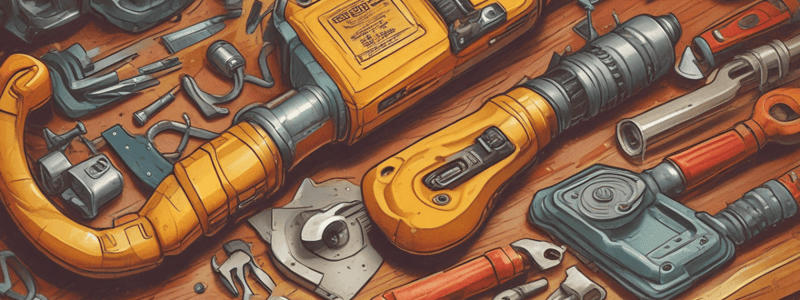Podcast
Questions and Answers
What is the primary purpose of selecting the correct rivet set for the job?
What is the primary purpose of selecting the correct rivet set for the job?
- To prevent damage to the rivet or the material to be fastened (correct)
- To reduce the weight of the rivet gun
- To improve the appearance of the rivet
- To increase the speed of the riveting process
What is the term used to describe the formation of the rivet head when using a rivet gun and set?
What is the term used to describe the formation of the rivet head when using a rivet gun and set?
- Shop rivet
- Bucking bar
- Shop head (correct)
- Rivet set
What is the advantage of using a squeeze riveter over a rivet gun?
What is the advantage of using a squeeze riveter over a rivet gun?
- Increased accuracy
- Improved appearance of the rivet
- Reduced time required to produce a uniform row of rivets (correct)
- Increased portability
What is the function of the dollies in a squeeze riveter?
What is the function of the dollies in a squeeze riveter?
What is an important safety precaution when using a rivet gun?
What is an important safety precaution when using a rivet gun?
What is the purpose of the bucking bar in a rivet gun?
What is the purpose of the bucking bar in a rivet gun?
What is the primary reason to disconnect tools when not in use?
What is the primary reason to disconnect tools when not in use?
Why should workers avoid holding a finger on the switch button while carrying a plugged-in tool?
Why should workers avoid holding a finger on the switch button while carrying a plugged-in tool?
What is the most serious danger associated with using electric tools?
What is the most serious danger associated with using electric tools?
What should be done to a portable electric tool that is damaged?
What should be done to a portable electric tool that is damaged?
Why should loose clothing, ties, or jewellery be avoided when using electric tools?
Why should loose clothing, ties, or jewellery be avoided when using electric tools?
Why is it important to keep electric tools sharp and clean?
Why is it important to keep electric tools sharp and clean?
What is the recommended technique when using a drill?
What is the recommended technique when using a drill?
What is the purpose of the metal guard on a bench grinder?
What is the purpose of the metal guard on a bench grinder?
What is the primary use of a bench grinder?
What is the primary use of a bench grinder?
What should you do if the drill slows down during operation?
What should you do if the drill slows down during operation?
What is the potential consequence of forcing a drill?
What is the potential consequence of forcing a drill?
Where can you find information about the specific type of grinding wheel required for a particular job?
Where can you find information about the specific type of grinding wheel required for a particular job?
What is the most important factor in determining the efficient drilling speed?
What is the most important factor in determining the efficient drilling speed?
What is the unit of measurement for drill speed?
What is the unit of measurement for drill speed?
What is the recommended drill speed for a 10 mm drill diameter?
What is the recommended drill speed for a 10 mm drill diameter?
Why should a small-diameter drill be run at a faster speed than a large-diameter drill?
Why should a small-diameter drill be run at a faster speed than a large-diameter drill?
What is the general rule for drill speed when cutting different metals?
What is the general rule for drill speed when cutting different metals?
What is the purpose of the drill speed table provided?
What is the purpose of the drill speed table provided?
What is the primary reason to keep the drill cutting and not just rubbing?
What is the primary reason to keep the drill cutting and not just rubbing?
What type of lubricant is recommended for drilling cast iron?
What type of lubricant is recommended for drilling cast iron?
What is the purpose of drilling a pilot hole when drilling large holes?
What is the purpose of drilling a pilot hole when drilling large holes?
Why should you wear eye protection when drilling?
Why should you wear eye protection when drilling?
What should you do before drilling a hole?
What should you do before drilling a hole?
What type of lubricant is recommended for drilling stainless steel?
What type of lubricant is recommended for drilling stainless steel?
Flashcards are hidden until you start studying
Study Notes
Electric Power Tools Safety Precautions
- Disconnect tools when not in use, before servicing, and when changing accessories like blades, bits, and cutters.
- Keep observers at a safe distance from the work area.
- Secure work with clamps or a vice to free both hands to operate the tool.
- Avoid accidental starting by not holding fingers on the switch button while carrying a plugged-in tool.
- Maintain tools with care by keeping them sharp and clean for the best performance.
- Follow instructions in the user's manual for lubricating and changing accessories.
Rivet Guns Safety Precautions
- Select the correct rivet set for the job to prevent damage to the rivet or material.
- Never aim a rivet gun at any person.
- Bucking bars (dollies) are available in various sizes and shapes, according to rivet size and access to the tail.
Squeeze Riveting
- Squeeze riveters are used for driving a large number of rivets along the edge of a sheet or in a stringer.
- A squeeze riveter consists of a pair of jaws: one stationary and the other moved by a piston in an air cylinder.
Drilling
- The most efficient drilling speed depends on variables like type and hardness of the material, diameter and material of the drill, and type and condition of the drill press.
- Cutting speeds for various materials are listed in the drill speed table.
- A small-diameter drill should be run at a faster speed than a large-diameter drill when cutting the same metal.
- Drills should be run faster when cutting soft metals, such as aluminum, than when cutting hard metals, such as mild steel.
- Do not force a drill and apply enough pressure to keep the drill bit cutting smoothly.
Bench Grinders
- A bench grinder is normally mounted to a bench and is fitted with a grinding wheel on each end of the shaft.
- The abrasive wheels must not be operated without guards securely in place.
- Bench grinders are used for off-hand (or hand-guided) grinding of small jobs and tools.
Drill Lubricants
- A suitable lubricant should be used to keep the drill cool and to assist swarf escaping up the flutes of the drill.
- Lubricants suitable for use with a range of metals are:
- Mild steel: soluble oil
- High-carbon steel: soluble oil
- Copper and brass: kerosene
- Cast iron: worked dry
- Aluminum: kerosene
- Stainless steel: soluble oil
Drilling Procedures
- Key steps for drilling a part include:
- Selecting the correct size drill
- Checking the speed
- Holding work securely
- Checking that the drill hole is on-centre
- Feeding the drill slowly through the metal
- Cleaning up
- Safety checks when drilling include:
- Wearing eye protection
- Only one person operating the press drill
- Not holding metal in your bare hand when drilling
- Drilling a pilot hole for holes of a diameter greater than 10 mm
- Using a suitable lubricant to prevent build-up of heat
Studying That Suits You
Use AI to generate personalized quizzes and flashcards to suit your learning preferences.




